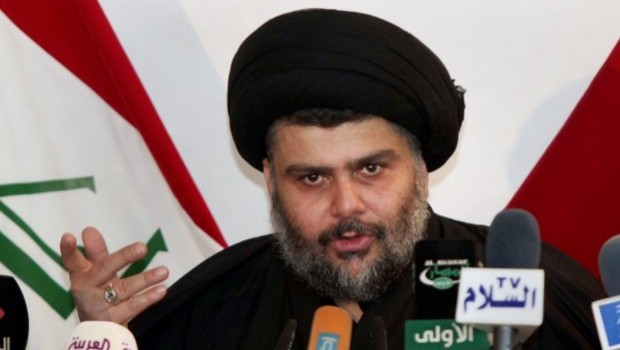
Shi’ite cleric Muqtada Al-Sadr speaks during a press conference in the Shi’a holy city of Najaf. (AP Photo/ Alaa al-Marjani)
Baghdad, Asharq Al-Awsat—Sadrist Movement leader Moqtada Al-Sadr accused Iraqi prime minister Nuri Al-Maliki of entrenching sectarianism in the country in a speech on Wednesday.
In a speech at the opening of the second Fatima Zahra Conference for religious dialogue and rapprochement, Sadr apologized to Iraq’s Sunnis for the government’s “cruelty and oppression” after violence between security forces and Sunni Arab protesters killed almost 200 people last month.
“I apologize to the Sunnis for the cruelty of the Shi’ite government,” Sadr said.
“The former president, Saddam Hussein, represented terrorism and mobilized Sunni armies in order to murder and suppress Shi’ite areas. Today, we find those who mobilize Shi’ite armies in order to murder and suppress Sunni areas,” he added.
Sadr emphasized that “our enemies are gloating because we are still fighting despite the fall of the Saddam Hussein regime.”
April was reportedly the deadliest month on record in Iraq since June 2008. The UN mission to Iraq reported that 712 people were killed last month, including 117 members of the Iraqi security forces.
At least 13 people were killed across Iraq on Wednesday, according to security officials. Five militiamen were killed and 12 others wounded in an attack near a military base in the town of Ramadi.
However, Maliki has laid the blame for the escalating violence and sectarianism firmly on the shoulders of the Iraqi protesters.
In a speech to the Second Conference for the Iraqi Tribes yesterday, which was organized by the interior ministry in Baghdad, Maliki said: “Iraq is in the same danger that the region is facing due to the challenges of sectarianism.”
“We want to wisely address the situation in the provinces witnessing protests in order to save citizens’ lives,” Maliki added.
The Iraqi prime minister criticized the protesters, emphasizing that many of them are armed and dubbing them a “tribal army.”
Jamal Al-Bateekh, the former minister for tribal affairs, told Asharq Al-Awsat that “the political elite in Iraq from all sects and political movements failed to protect society and provide it with what it needs. This led Iraq to resort to tribalism once more.”
“Tribal conferences are important at this stage, on the condition that they are not exploited to serve the interests of any specific party. Besides this, it is necessary to respect the tribal hierarchies and not weaken tribal unity,” he added.
However, Bateekh stressed that “the tribe is not an alternative to the state and rule of law; rather, it supports these.”
Bateekh attempted to justify the attack carried out by Iraqi army forces against the so-called tribal army in Anbar, informing Asharq Al-Awsat: “There cannot be armies or militias acting as alternatives to the national army which must be respected by all.”
“Forming an army here and one there means the beginning of the fragmentation and collapse of both the society and homeland,” he added.
